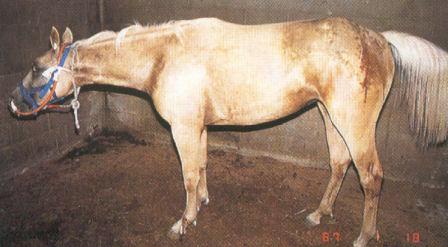Tetanus is the name given to a potentially fatal infection caused by the bacteria Clostridium tetani. These bacteria live in the soil and can contaminate wounds, releasing a neurotoxin (tetanospasmin). This neurotoxin acts on the nerves supplying skeletal muscle, causing the muscles to go into a rigid spasm (tetany). Ultimately, this can result in failure of the muscles involved in respiration, resulting in death.
Horses are amongst the most sensitive of mammals to this infection.
Infected horses appear very rigid and usually have prolapsed third eye lids, a wide-eyed stare and have their tail held out.

Horse suffering from tetanus - note rigid tail and rigid stance
Tetanus can prove very difficult to treat, with treatment often being unsuccessful.
The only way to prevent your horse from contracting tetanus is to vaccinate your horse. Fortunately, the vaccine works very well and is very safe to use.
Tetanus vaccination is recommended whether or not your horse leaves the yard or meets other horses as the organism responsible for infection is everywhere in the environment. Initial (primary course) vaccination starts with two injections given 4-6 weeks apart. Following the initial course, booster injections should be given at least every one to three years, depending on the vaccine manufacturer's instructions. If you are unsure how long your horse’s tetanus vaccine lasts for contact us here at Central Equine Vets. As with other equine vaccines, side effects are not common but horses may occasionally become stiff or sore around the site of injection after it is given. If this is the case contact us for advice.
If your horse is not fully vaccinated against tetanus and becomes exposed to infection e.g. a cut or penetrating wound, then an injection of tetanus 'antitoxin' should be given for protection. This antitoxin is not a vaccination but it will stop any toxin produced by the bacteria from attacking the nerves and causing paralysis. Once the antitoxin has worn off (after just a few days) your horse will be unprotected again, and should be vaccinated against tetanus as soon as possible.